Informationen zur Zeitschrift
Home » Publications » IJREE 1-2013 | National Research Reports (Part I)
IJREE 1-2013 | National Research Reports (Part I)
Erscheinungsdatum : 28.10.2013
0,00 € - 35,00 €
Inhalt
IJREE – International Journal for Research on Extended Education
1-2013: National Research Reports (Part I)
Main Topic
Manuela du Bois-Reymond: Extended Education in the Netherlands
Marianne Schüpbach / Benjamin von Allmen: Swiss National Report on Research on Extended Education
Ludwig Stecher / Sabine Maschke: Research on Extended Education in Germany – A General Model with All-day Schooling and Private Tutoring as Two Examples
Sang Hoon Bae / Sue Bin Jeon: Research on Afterschool Programs in Korea: Trends and Outcomes
Free Contributions
Andrea E. Vest / Joseph L. Mahoney / Sandra D. Simpkins: Patterns of Out-Of-School Time Use Around the World: Do They Help to Explain International Differences in Mathematics and Science Achievement
Maria Hjalmarsson: Governance and Voluntariness for Children in Swedish Leisure-Time Centres: Leisure-Time Teachers Interpreting Their Tasks and Everyday Practice
Reviews
Adam C. Sheppard: After-School Centers and Youth Development: Case Studies of Success and Failure.
Stephan Kielblock: “Schools can ignore what lies beyond their gates, but they cannot escape it!”
Download of Table of Contents / Inhaltsverzeichnis herunterladen
Download of single articles (Open Access/fee-based): ijree.budrich-journals.com
You can register here for the IJREE alert.
Einzelbeitrag-Download (Open Access/Gebühr): ijree.budrich-journals.com
Sie können sich hier für den IJREE-Alert anmelden.
Zusätzliche Informationen
| Publisher | |
|---|---|
| ISSN | 2196-3673 |
| eISSN | 2196-7423 |
| Volume | 1. Jahrgang 2013 |
| Edition | 1 |
| Date of publication | 28.10.2013 |
| Scope | 106 |
| Language | Englisch |
| Format | 17 x 24 cm |
| Homepage |
Autor*innen
Keywordsacademic achievement, after-school centres, after-school programs, afterschool participation, children, educational effectiveness, extended education, extracurricular activities, Germany, governance, international comparison, Korea, leisure-time centres, leisure-time teachers, out-of-school activities, private tutoring, school, Sweden, Switzerland, teacher professionalism, TIMSS, voluntariness, youth development
Abstracts
Extended Education in the Netherlands (Manuela du Bois-Reymond)
The article deals with the concept of extended education as it is applied in Dutch primary and secondary schools. While the development of “the brede school” (broad school – BS) in the primary sector is now part of all schools, the introduction of BS in secondary education did not proceed with the same speed. The main argument of the article is that in the BS the formal and the non-formal curriculum remain largely at a distance from each other, less so in the primary and more so in the secondary sector, and that is disadvantageous for the development of a learning biography. The article accrues research findings supporting this argument. Keywords: learning biography, Dutch “brede school”, transitions, teacher training
» Download Single Contribution (Budrich Journals) / Einzelbeitrag kostenlos herunterladen (Budrich Journals)
Swiss National Report on Research on Extended Education (Marianne Schüpbach, Benjamin von Allmen)
The purpose of this article is to give an overview of research on extended education in Switzerland and to point out the gaps in the field. In Switzerland official education statistics and research on extended education are still in their infancy. This is directly associated with the fact that extended education has only been widely discussed within the last 10 years and has begun to be implemented within the last five years. Some studies on extended education are available in Switzerland in four areas: (1) data on official education statistics and studies on availability and use of and demand for extended education, (2) evaluations of all-day schools, (3) studies on quality and effectiveness of all-day schools, and (4) studies on collaboration in all-day schools. Keywords: Research review, extended education, all-day schools, extracurricular activities, Switzerland
» Download Single Contribution (Budrich Journals) / Einzelbeitrag kostenlos herunterladen (Budrich Journals)
Research on Extended Education in Germany – A General Model with All-day Schooling and Private Tutoring as Two Examples (Ludwig Stecher, Sabine Maschke)
Although research on extended education is similar to school-focused research in some respects, in other respects it involves new research perspectives and questions. Our article presents an analytical model on extended education that is based on school-effectiveness research and the work of Fischer and Klieme (2013). We summarise selected research findings in two areas of extended education: all-day schooling and private tutoring. While much research has been done in the first area, there is a considerable lack in the second. Our model and the findings that we are reporting can be used to guide further research in the field of extended education. Keywords: research on extended education, all-day schools, private tutoring, educational effectiveness
» Download Single Contribution (Budrich Journals) / Einzelbeitrag kostenlos herunterladen (Budrich Journals)
Research on Afterschool Programs in Korea: Trends and Outcomes (Sang Hoon Bae, Sue Bin Jeon)
Afterschool programs in Korea have been widespread and even regarded as being institutionalized recently. A clear evidence of this phenomenon is that quite a number of students and parents choose afterschool programs as the alternative to private tutoring. Therefore, this study aims to explore the recent research trends and outcomes on afterschool programs in Korea. The researchers reviewed and analyzed approximately one hundred recent studies on afterschool programs in Korea. One outstanding trend of research on afterschool program is, despite dominance of the studies using personally-collected data, the number of studies by using large-scaled national data has increased since the latter half of the 2000s. In addition, recent studies tend to be substantial in research topics and method; many of recent studies have examined the impact of afterschool participation on academic improvement and the reduction of private tutoring expenditure by using statistical methods. Those studies generally presented positive effects of afterschool participation on students’ academic achievement and the reduction of private education expenditure. Keywords: research on afterschool programs, educational effectiveness, afterschool participation, academic achievement
» Download Single Contribution (Budrich Journals) / Einzelbeitrag kostenlos herunterladen (Budrich Journals)
Patterns of Out-Of-School Time Use Around the World: Do They Help to Explain International Differences in Mathematics and Science Achievement (Andrea E. Vest, Joseph L. Mahoney, Sandra D. Simpkins)
International studies suggest that the U.S. ranks below many Asian and European countries in the 21st century in terms of mathematics and science achievement. Few have looked beyond the classroom to understand these differences. Absolute and relative time spent in various out-of-school time (OST) activities may provide one explanation. This study used the Trends in International Mathematics and Science Study (TIMSS), which includes data on the OST and achievement of 8th graders from nearly 50 countries worldwide. OST variables included technology-based (e.g., using the internet), labor (e.g., chores), and leisure activities (e.g., sports, playing with friends). Students completed an internationally standardized mathematics and science achievement test. Results for absolute OST suggest that, beyond the large contribution of a country’s human development index, OST is an important predictor of achievement. Further, relative OST is an important predictor, such that, those countries whose profile of time use was highest in technology also had the highest achievement scores. Future research should consider a broader view of education and related contexts that includes understanding the variability in OST use both within and between nations. Keywords: out-of-school time activities, academic achievement, TIMSS, international comparison
» Download Single Contribution (Budrich Journals) / Einzelbeitrag kostenlos herunterladen (Budrich Journals)
Governance and Voluntariness for Children in Swedish Leisure-Time Centres: Leisure-Time Teachers Interpreting Their Tasks and Everyday Practice (Maria Hjalmarsson)
The aim of this article is to explore and discuss the tension between certain aspects of governance and voluntariness for children in the context of Swedish leisure-time centres meant for younger school children. The data consists of interviews with leisure-time teachers in five settings. The results show that there appears to be a paradox in that not offering children organized activities may be interpreted as childminding while at the same time the leisure-time teachers emphasize the importance of letting the children choose which activities they wish to be involved in. This may be a question of how the leisure-time teachers interpret and understand the concept of leisure and its consequences in everyday practice. In absence of a task to evaluate the learning outcomes of the children, the leisure-time teachers need to find other ways to describe and show the high quality of the activities offered. Working with carrying out quality reports may be such a means. Keywords: Leisure-time centre, leisure-time teacher, quality, children, voluntariness, governance, teacher professionalism
» Download Single Contribution (Budrich Journals) / Einzelbeitrag kostenlos herunterladen (Budrich Journals)
Inhalt
Inhalt
IJREE – International Journal for Research on Extended Education
1-2013: National Research Reports (Part I)
Main Topic
Manuela du Bois-Reymond: Extended Education in the Netherlands
Marianne Schüpbach / Benjamin von Allmen: Swiss National Report on Research on Extended Education
Ludwig Stecher / Sabine Maschke: Research on Extended Education in Germany – A General Model with All-day Schooling and Private Tutoring as Two Examples
Sang Hoon Bae / Sue Bin Jeon: Research on Afterschool Programs in Korea: Trends and Outcomes
Free Contributions
Andrea E. Vest / Joseph L. Mahoney / Sandra D. Simpkins: Patterns of Out-Of-School Time Use Around the World: Do They Help to Explain International Differences in Mathematics and Science Achievement
Maria Hjalmarsson: Governance and Voluntariness for Children in Swedish Leisure-Time Centres: Leisure-Time Teachers Interpreting Their Tasks and Everyday Practice
Reviews
Adam C. Sheppard: After-School Centers and Youth Development: Case Studies of Success and Failure.
Stephan Kielblock: “Schools can ignore what lies beyond their gates, but they cannot escape it!”
Download of Table of Contents / Inhaltsverzeichnis herunterladen
Download of single articles (Open Access/fee-based): ijree.budrich-journals.com
You can register here for the IJREE alert.
Einzelbeitrag-Download (Open Access/Gebühr): ijree.budrich-journals.com
Sie können sich hier für den IJREE-Alert anmelden.
Bibliography
Zusätzliche Informationen
| Publisher | |
|---|---|
| ISSN | 2196-3673 |
| eISSN | 2196-7423 |
| Volume | 1. Jahrgang 2013 |
| Edition | 1 |
| Date of publication | 28.10.2013 |
| Scope | 106 |
| Language | Englisch |
| Format | 17 x 24 cm |
| Homepage |
Produktsicherheit
Bewertungen (0)
Bewertungen
Es gibt noch keine Bewertungen.
Authors
Autor*innen
Tags
Keywordsacademic achievement, after-school centres, after-school programs, afterschool participation, children, educational effectiveness, extended education, extracurricular activities, Germany, governance, international comparison, Korea, leisure-time centres, leisure-time teachers, out-of-school activities, private tutoring, school, Sweden, Switzerland, teacher professionalism, TIMSS, voluntariness, youth development
Abstracts
Abstracts
Extended Education in the Netherlands (Manuela du Bois-Reymond)
The article deals with the concept of extended education as it is applied in Dutch primary and secondary schools. While the development of “the brede school” (broad school – BS) in the primary sector is now part of all schools, the introduction of BS in secondary education did not proceed with the same speed. The main argument of the article is that in the BS the formal and the non-formal curriculum remain largely at a distance from each other, less so in the primary and more so in the secondary sector, and that is disadvantageous for the development of a learning biography. The article accrues research findings supporting this argument. Keywords: learning biography, Dutch “brede school”, transitions, teacher training
» Download Single Contribution (Budrich Journals) / Einzelbeitrag kostenlos herunterladen (Budrich Journals)
Swiss National Report on Research on Extended Education (Marianne Schüpbach, Benjamin von Allmen)
The purpose of this article is to give an overview of research on extended education in Switzerland and to point out the gaps in the field. In Switzerland official education statistics and research on extended education are still in their infancy. This is directly associated with the fact that extended education has only been widely discussed within the last 10 years and has begun to be implemented within the last five years. Some studies on extended education are available in Switzerland in four areas: (1) data on official education statistics and studies on availability and use of and demand for extended education, (2) evaluations of all-day schools, (3) studies on quality and effectiveness of all-day schools, and (4) studies on collaboration in all-day schools. Keywords: Research review, extended education, all-day schools, extracurricular activities, Switzerland
» Download Single Contribution (Budrich Journals) / Einzelbeitrag kostenlos herunterladen (Budrich Journals)
Research on Extended Education in Germany – A General Model with All-day Schooling and Private Tutoring as Two Examples (Ludwig Stecher, Sabine Maschke)
Although research on extended education is similar to school-focused research in some respects, in other respects it involves new research perspectives and questions. Our article presents an analytical model on extended education that is based on school-effectiveness research and the work of Fischer and Klieme (2013). We summarise selected research findings in two areas of extended education: all-day schooling and private tutoring. While much research has been done in the first area, there is a considerable lack in the second. Our model and the findings that we are reporting can be used to guide further research in the field of extended education. Keywords: research on extended education, all-day schools, private tutoring, educational effectiveness
» Download Single Contribution (Budrich Journals) / Einzelbeitrag kostenlos herunterladen (Budrich Journals)
Research on Afterschool Programs in Korea: Trends and Outcomes (Sang Hoon Bae, Sue Bin Jeon)
Afterschool programs in Korea have been widespread and even regarded as being institutionalized recently. A clear evidence of this phenomenon is that quite a number of students and parents choose afterschool programs as the alternative to private tutoring. Therefore, this study aims to explore the recent research trends and outcomes on afterschool programs in Korea. The researchers reviewed and analyzed approximately one hundred recent studies on afterschool programs in Korea. One outstanding trend of research on afterschool program is, despite dominance of the studies using personally-collected data, the number of studies by using large-scaled national data has increased since the latter half of the 2000s. In addition, recent studies tend to be substantial in research topics and method; many of recent studies have examined the impact of afterschool participation on academic improvement and the reduction of private tutoring expenditure by using statistical methods. Those studies generally presented positive effects of afterschool participation on students’ academic achievement and the reduction of private education expenditure. Keywords: research on afterschool programs, educational effectiveness, afterschool participation, academic achievement
» Download Single Contribution (Budrich Journals) / Einzelbeitrag kostenlos herunterladen (Budrich Journals)
Patterns of Out-Of-School Time Use Around the World: Do They Help to Explain International Differences in Mathematics and Science Achievement (Andrea E. Vest, Joseph L. Mahoney, Sandra D. Simpkins)
International studies suggest that the U.S. ranks below many Asian and European countries in the 21st century in terms of mathematics and science achievement. Few have looked beyond the classroom to understand these differences. Absolute and relative time spent in various out-of-school time (OST) activities may provide one explanation. This study used the Trends in International Mathematics and Science Study (TIMSS), which includes data on the OST and achievement of 8th graders from nearly 50 countries worldwide. OST variables included technology-based (e.g., using the internet), labor (e.g., chores), and leisure activities (e.g., sports, playing with friends). Students completed an internationally standardized mathematics and science achievement test. Results for absolute OST suggest that, beyond the large contribution of a country’s human development index, OST is an important predictor of achievement. Further, relative OST is an important predictor, such that, those countries whose profile of time use was highest in technology also had the highest achievement scores. Future research should consider a broader view of education and related contexts that includes understanding the variability in OST use both within and between nations. Keywords: out-of-school time activities, academic achievement, TIMSS, international comparison
» Download Single Contribution (Budrich Journals) / Einzelbeitrag kostenlos herunterladen (Budrich Journals)
Governance and Voluntariness for Children in Swedish Leisure-Time Centres: Leisure-Time Teachers Interpreting Their Tasks and Everyday Practice (Maria Hjalmarsson)
The aim of this article is to explore and discuss the tension between certain aspects of governance and voluntariness for children in the context of Swedish leisure-time centres meant for younger school children. The data consists of interviews with leisure-time teachers in five settings. The results show that there appears to be a paradox in that not offering children organized activities may be interpreted as childminding while at the same time the leisure-time teachers emphasize the importance of letting the children choose which activities they wish to be involved in. This may be a question of how the leisure-time teachers interpret and understand the concept of leisure and its consequences in everyday practice. In absence of a task to evaluate the learning outcomes of the children, the leisure-time teachers need to find other ways to describe and show the high quality of the activities offered. Working with carrying out quality reports may be such a means. Keywords: Leisure-time centre, leisure-time teacher, quality, children, voluntariness, governance, teacher professionalism
» Download Single Contribution (Budrich Journals) / Einzelbeitrag kostenlos herunterladen (Budrich Journals)




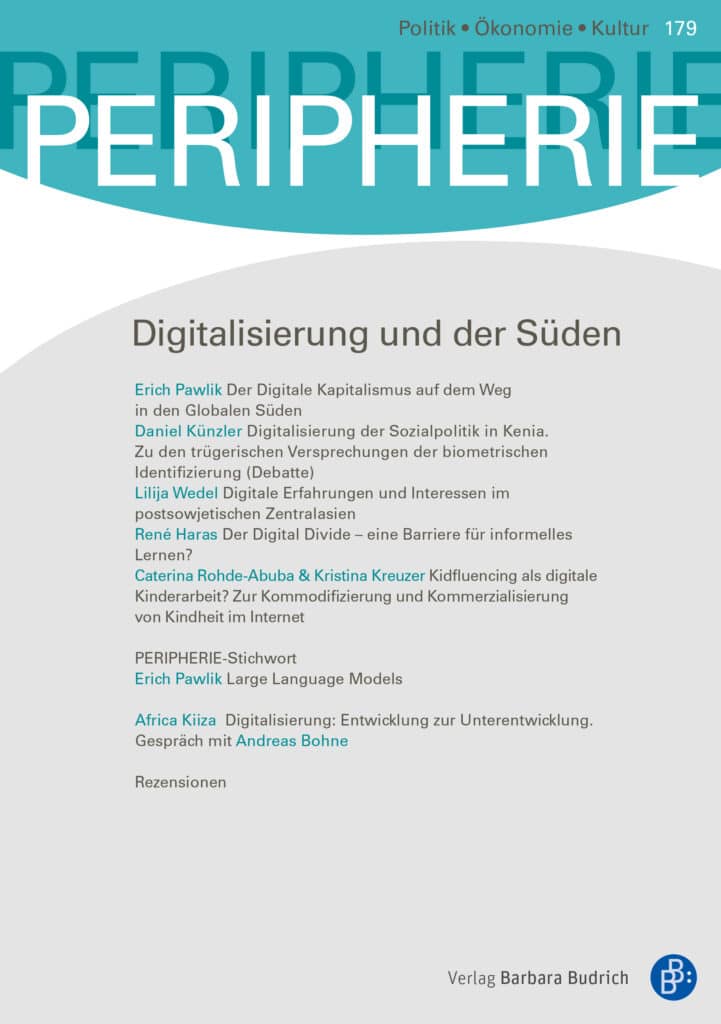
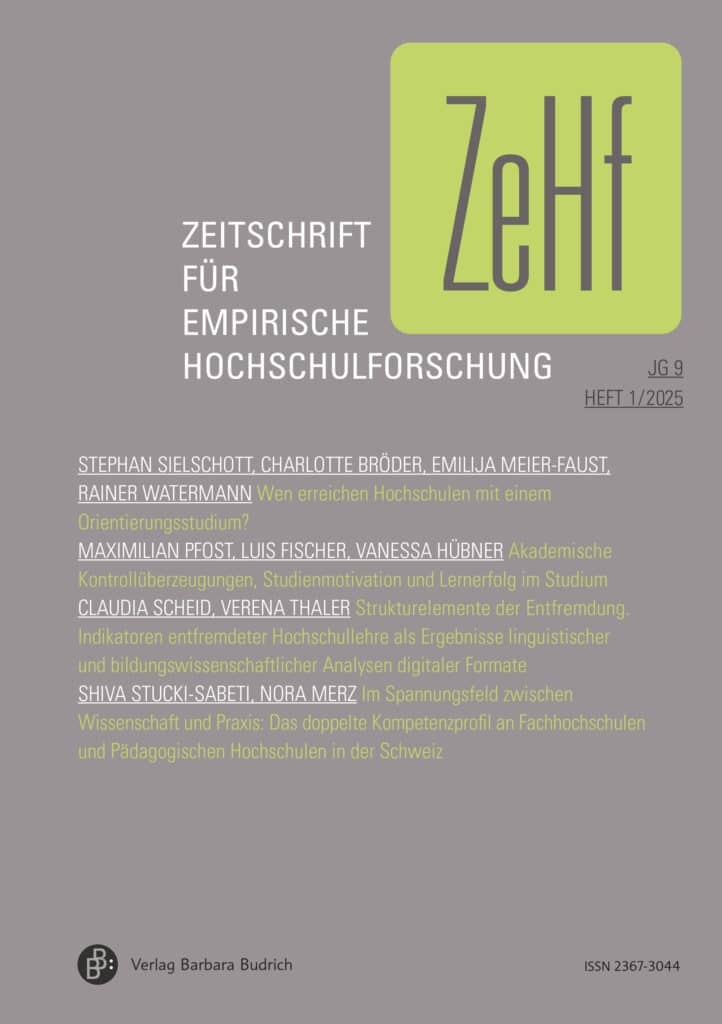
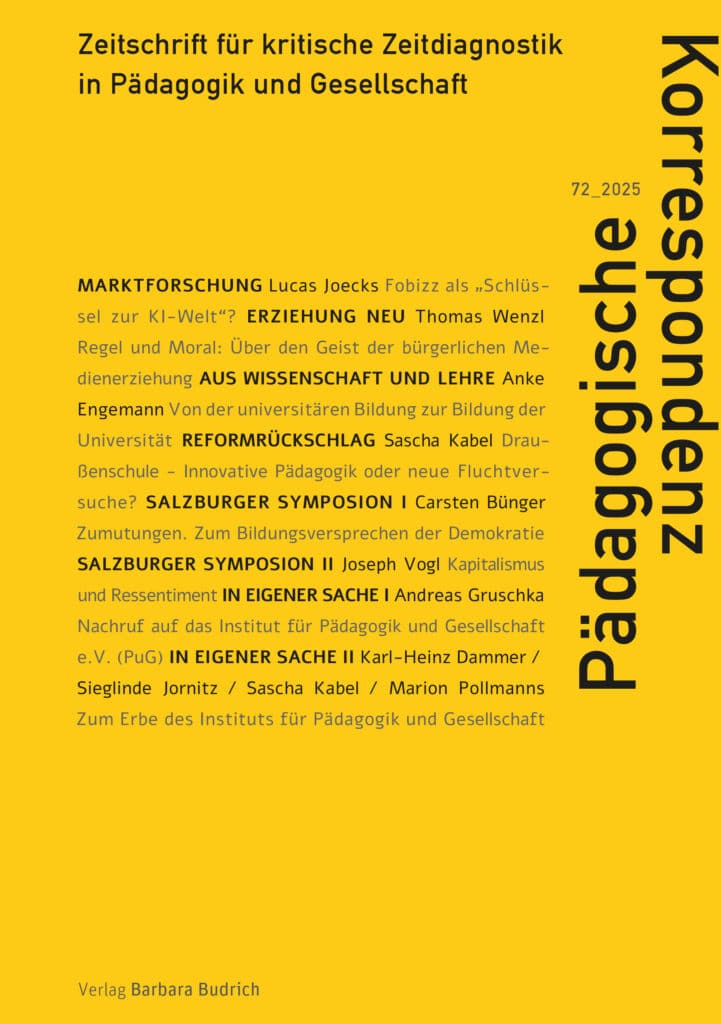
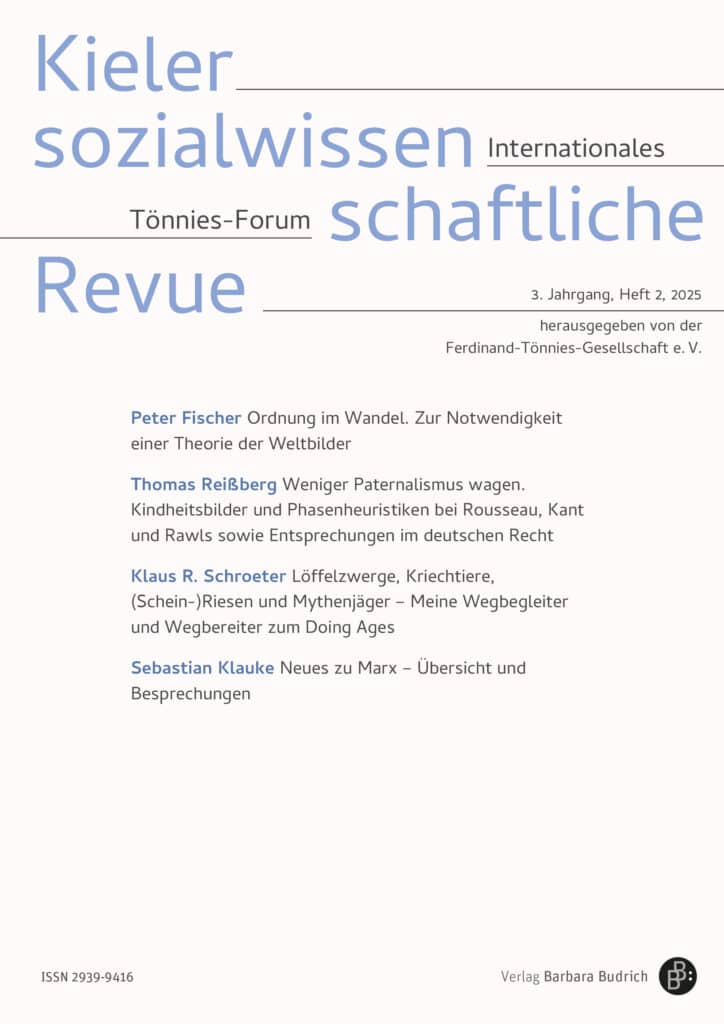
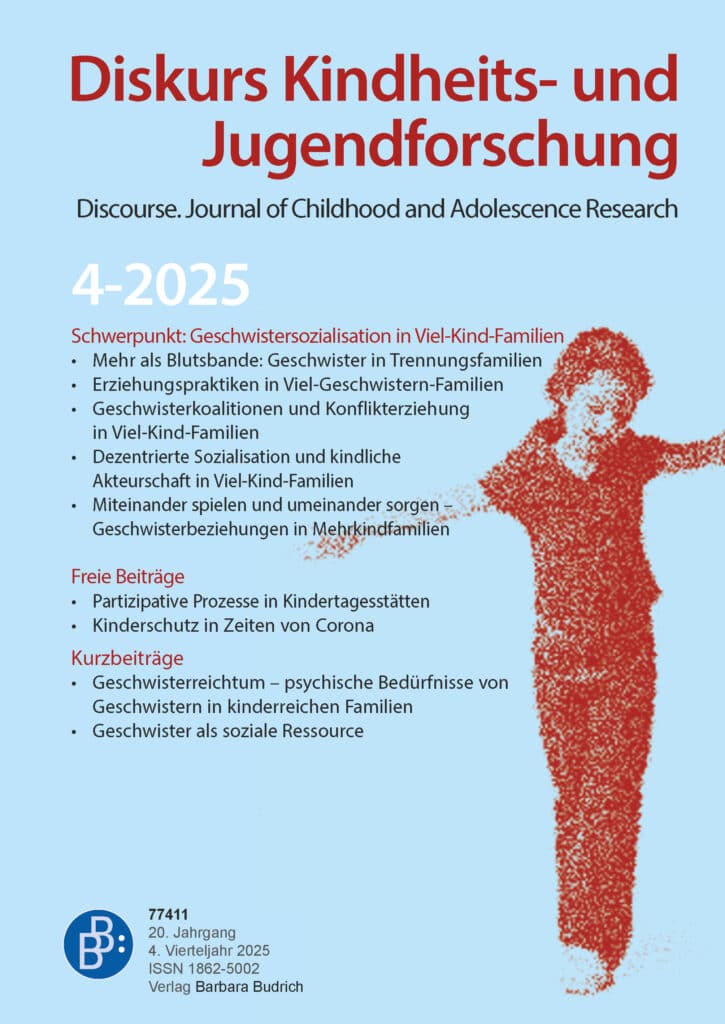

Bewertungen
Es gibt noch keine Bewertungen.